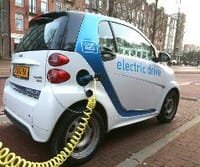(STRASBOURG) – Market uptake of electric and low- emission cars would be expected to accelerate following a vote Wednesday by the European Parliament to lower CO2 emissions by 20% by 2025, and 40% by 2030.
In the draft law, MEPs voted to set a higher target for reducing EU fleet-wide emissions for new cars by 2030 of 40% (compared to the EU Commission’s 30%; year of reference 2021) with an intermediate target of 20% by 2025. Similar targets are set for new vans.
Manufacturers whose average CO2 emissions exceed these targets will pay a fine to the EU budget, to be used for up-skilling workers affected by changes in the automotive sector, MEPs agreed.
Carmakers will also have to ensure that zero- and low- emission vehicles – ZLEVs – (electric cars or vehicles which emit less than 50g CO2/km) have a 35% market share of sales of new cars and vans by 2030, and 20% by 2025.
Air pollution is the biggest environmental risk to health, causing death for more than 400,000 people every year in Europe. According to the WHO, heart disease, stroke, chronic obstructive pulmonary disease (COPD), asthma and cancer are the main cause of premature deaths due to air pollution.
In addition to this, a special report by the European Court of Auditors has shown that air pollution wastes between 330 billion and 940 billion per year.
Regarding emissions testing, the EU Parliament is now calling on the Commission to table, within two years, plans for a ‘real-world CO2 emissions test’ using a portable device, like that recently introduced for NOx. Until then, CO2 emissions must be measured based on data from the cars’ fuel consumption meters. The real-driving emissions test must be up and running from 2023, say MEPs.
MEPs acknowledge that a socially acceptable and just transition towards zero-emission mobility requires changes throughout the automotive value chain, with possible negative social impacts. The EU should therefore promote skill development and reallocation of workers in the sector, particularly in regions and communities most affected by the transition. MEPs also call for support for European battery manufacturing.
By the end of 2019, the Commission will have to propose legislation to provide consumers with accurate and comparable information on the fuel consumption, CO2 and pollutant emissions of new cars. And from 2025, carmakers will have to report the lifecycle of CO2 emissions of new cars put on the market, using a common methodology.
“This legislation goes beyond reducing harmful emissions and protecting the environment,” said the Parliament’s rapporteur Miriam Dalli MEP: “It looks at setting the right incentives for manufacturers; it encourages investment in the infrastructure; it proposes a just transition for workers.”
Following Parliament’s adoption of the report, EU ministers will adopt their common position on 9 October, with negotiations with MEPs for a first reading agreement starting a day later.
Further information, European Parliament
Adopted text will be available here (click on 03.10.2018)








